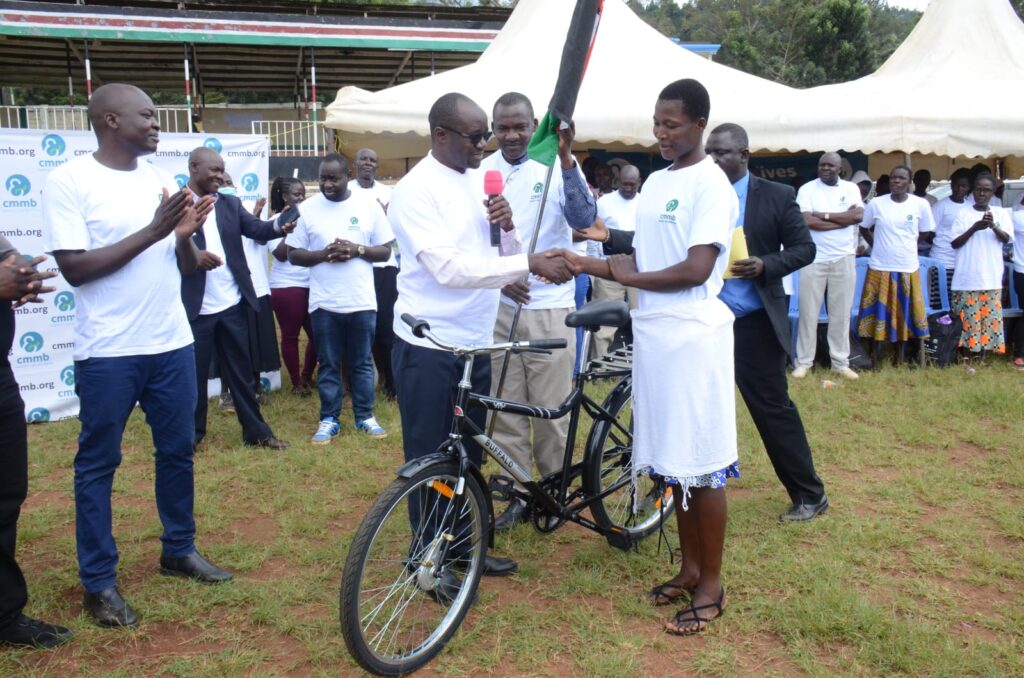
As the world celebrated AIDS Day on December 1, Migori stakeholder are banking on midwives to reverse the high prevalence rates.
Locally known as ‘Nyamrerwa’ and respected in villages, stakeholders have turned on them as Community Health Volunteers to help reverse the high prevalence rates.
Dorothy Ogidi, coordinator on STI said the prevalence rate stands at 13 per cent and they have been banking on the CHVs to get on adherence by tracing those who are defaulting on Anti-Retro-Viral disease.
“We heavily bank on community health volunteers to tackle HIV stigma, push through testing and ensuring patients adhere to taking ARVs, these will tackle spread and new cases,” Ogidi said.
Within a month World Bicycle Relief through two non-government organisations have donated over 300 bicycles to CHVs in the county to help support their movement.
“They will majorly help in ease of defaulter tracing for persons living with HIV/AIDs especially those reluctant on visiting health facilities and still suffering from stigma,” Ogidi said.
Rose Jomo who is a CHV from Awendo Sub-County said they will target pregnant mothers to ensure they give births in hospitals to avoid passing the virus to new borns.
“We really found it hard to reach sick people who are in our communities as the distance was too far,” Silvance Oyugi, a CHV in Nyatike Sub-County said, adding that when they reach at the homesteads, the patients they get sometimes as for something to buy food.
According to Oyugi, the bicycles will also enable them to carry those who are very sick and in dire need to health facilities.
The CHVs have been involved in the vital role of visiting homesteads where they advise HIV/AIDs positive patients to take their drugs constantly and encourage family members to embrace and support them.
They have also been key in providing home-based health care services to children under the age of five and advising mothers on healthy upbringing of the children.
Catholic Medical Mission Board (CMMB) officer Hillary Ngeso said they hope with the bikes CHVs will be able to reach a wider area.
“These will ensure their work can be done faster and that they reach more households,” Ngeso said.
Ripple Effect, another NGO involved in the distribution said they have been keen on boosting nutrition by focusing on farmers grops.
Through the Ripple Effect and World Bicycle Relief, the two organisations offered the bicycles to farmers groups in Kakrao and West Kanyamkago wards.
“We started off as groups which were affected by HIV and wanted to boost our nutrition through kitchen gardens and fruit farming, before we realized we could make money,” Jane Auma, a member of Ogongo Women Group said.
She said after realizing there is a need to tackle malnutrition and boost local economy they started up kitchen gardens among members and chicken rearing.
“We started off with banana farming as a best means to boost food security and we realized we could sell off, these bicycles will help in our work,” Auma said.
Jacktone Odundo, chairman of Suna East Pamoja Farmers Cooperatives Society which has 411 members said the bicycles will be offered to group members who have been acting as extension officers.
“Among our group members we have those who have been offering extension services life vaccines to chicken and seeds, this will make our work easier,” Odundo said.
Titus Sagala, the country Director Ripple Effect said the bicycles will also be used to transport produce to the market apart from family use.
“We started by promotion of nutritious food and creating kitchen gardens in homes, we saw a new need to increase extension services for more farmers,” Sagala said.
Peter Wechuli, World Bicyle Relief said the donation will help in mobility to access markets for their farm.
The project was worth Sh3m and the two said they will scale it up to Sh10m in the future.

